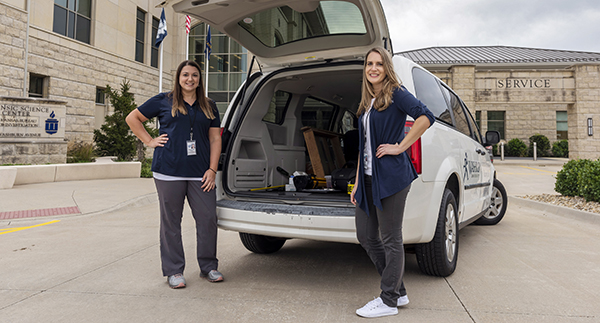Active Investigators
Forensic anthropology students get an edge with crime-scene casework

From The Ichabod - Winter 2020
Law enforcement agencies have surveyed the scene and need help identifying human remains. Everything the Washburn University forensic anthropology students learned in the classroom will now be put to work. This is no longer an exercise in the dig site outside the KBI Forensic Science Center on campus. The sights, smells and emotions are all real, and perhaps overwhelming. This is an active investigation and the beginning of a recovery process hopefully bringing closure and justice.
“I was thinking to myself, ‘It’s time to be an adult. This is your future job, so deal with it,’” said Susie Athey, bs ’19, recalling her first investigation while an anthropology student with a concentration in forensics.
Alexandra Klales, assistant professor, sociology and anthropology, gets calls from law enforcement, coroners and medical examiners throughout Kansas and Missouri when traditional forensic methods like fingerprinting and facial identification may not be possible. She and Ashley Maxwell, lecturer, sociology and anthropology, bring along students who have the proper coursework and training in safety, ethics, professionalism and confidentiality. Members of the Washburn University Forensic Anthropology Recovery Unit – the WU-FARU team, as they call themselves – always have their go-bags packed, ready to leave on short notice. A van is equipped to aid in recovery and transportation. The scene may be a surface scatter, a burial, fire or, as Klales said, complex scenes with decomposed, skeletonized or badly-modified bodies.
“Most of what we see is the unpleasant side of society,” she said. “Students realize it's not as glamorous as it is on television, and I think it helps them solidify if forensic anthropology is what they want to do with their career.”
The classroom training paid off for Athey and two other students in 2017 during the first recovery at Washburn. The lead KBI investigator later told Klales how great her graduate students were. She had to correct him and say they were undergraduate students.
“When we got to the scene, the students were very professional. It was a proud moment for me,” Klales said. “They knew exactly what to do because we had done it at the KBI dig site the semester before. That's where they got all the mistakes out and got into a rhythm and a workflow with one another.”
This level of experience is rare. Klales came to Washburn in 2016 when the University added forensic anthropology after the KBI lab opened. She is one of 91 individuals actively certified by the American Board of Forensic Anthropology. Washburn’s program is one of just two bachelor’s-level programs in the United States and one of only five that lets undergraduates do active forensic casework. All of this gives students an advantage when applying for jobs and graduate school in this highly competitive field.
Examining skeletal remains, forensic anthropologists estimate sex, age, ancestry and height to aid investigations. They determine the cause of physical trauma to the skeleton. As a master’s student, Klales developed a method for estimating sex by examining the pelvis. That method is now named after her. She recently wrote a textbook chapter titled, “A Unique Case of Skeletal Trauma Involving Scissors.” Perplexed by this case and under pressure from investigators, she went to a colleague for advice. She knew the weapon or weapons created two parallel but differing marks at each trauma point. Her colleague scanned her office and noticed a pair of scissors on the desk. They stabbed the opened scissors into clay, and that made similar marks. This evidence helped get a guilty plea.
The cases Washburn students assist with can have just as much on the line.
“I get to help bring a loved one home to somebody,” Athey said.
Holly Long, bs ’19, also an anthropology graduate with a concentration in forensics, wants to do international human rights work, bringing justice to victims of cultural and ethnic mass murders.
“Getting to re-identify someone – and then their families know what happened to them, even though it's not always a positive outcome – that's what really drew me to human rights work,” Long said.
Both students are grateful for the experience they received as they look ahead to graduate school.
“When Dr. Klales writes a letter for us for grad school or her name is on our research projects and posters, that helps. People know her,” Athey said.
Maxwell started at Washburn in January 2019 and brought a background in forensics and bio-archaeology. She recalled her first forensic anthropology casework as a graduate student in 2010.
“It was really emotional for me,” Maxwell said. “You realize this is someone recently deceased, as opposed to archaeological remains. You can put a face to it.”
The relatively young field of forensic anthropology applies archaeological practices to active criminal investigations. Quick answers are crucial.
“I used to work in Poland over the summer at a field school,” Klales said. “We’d have three months to excavate these burials and we’d go back every year. We don’t have that kind of time to excavate a crime scene. It can be much more emotional because you know the person's name. You see pictures of them. You're talking to people who knew them as a person. Getting justice for them is very rewarding, and I think that’s why most of us do it.”